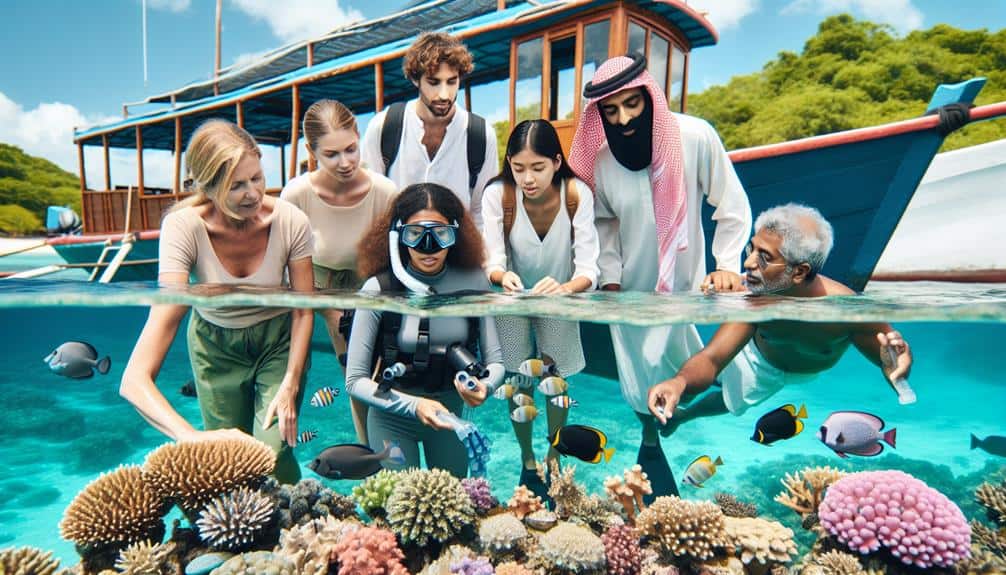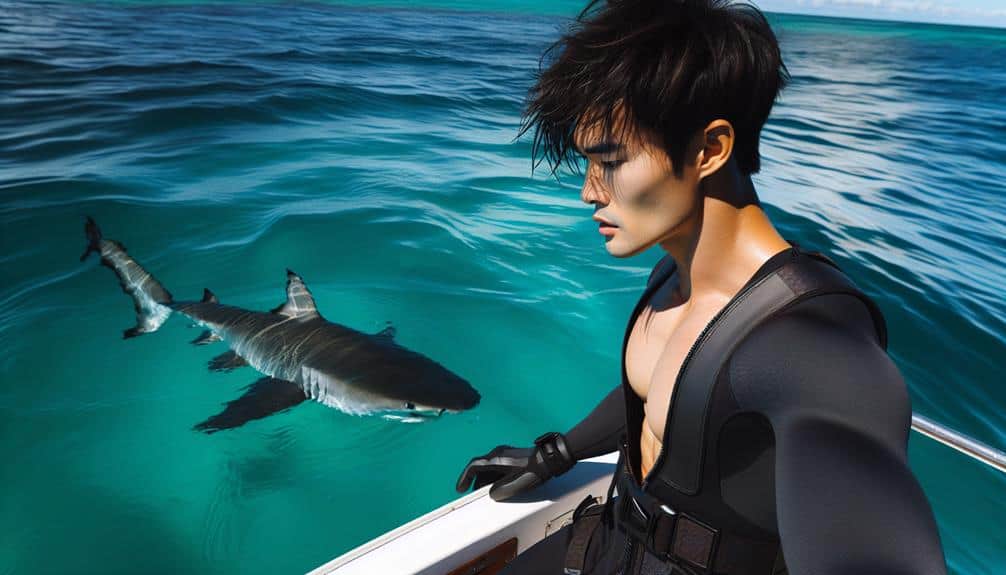Choose sustainable marine wildlife tourism by selecting responsible operators with track records of ethical practices and certifications. Prioritize the well-being of marine animals, adhere to regulations, and support conservation. Respect wildlife by maintaining safe distances, avoiding feeding, and visiting ethical sanctuaries. Opt for eco-friendly cruises to minimize impact and support conservation initiatives. Educate yourself through local engagement and expert-led programs. Support marine conservation by spreading awareness, seeking funding, donating, and participating in fundraisers. Follow these tips for a truly impactful experience that contributes to the preservation of marine ecosystems and wildlife.
Key Points
- Choose responsible operators with sustainable practices and certifications.
- Respect wildlife by maintaining safe distances and avoiding feeding.
- Opt for small eco-friendly cruises to minimize environmental impact.
- Educate yourself and others about marine environments and conservation.
- Support conservation efforts through funding, donations, and awareness.
Choose Responsible Wildlife Operators
When selecting wildlife operators for marine tours, prioritize those with established track records of responsible practices. Operator vetting is essential to guarantee ethical practices and minimize negative impacts on marine wildlife and local communities. Look for operators who follow guidelines set by conservation organizations and have certifications demonstrating their commitment to sustainable tourism.
Responsible wildlife operators prioritize the well-being of marine animals and their habitats. They adhere to strict regulations to avoid disturbing or harming wildlife during tours. By choosing operators with ethical practices, you contribute to the conservation efforts and support the local communities that depend on marine tourism.
Before booking a tour, research the operator's background, reviews, and affiliations with conservation groups. Ask about their policies regarding wildlife interactions, waste management, and community involvement. By making informed choices and supporting responsible operators, you play a crucial role in promoting sustainable marine wildlife tourism.
Respect Marine Wildlife Guidelines
Follow established marine wildlife guidelines to guarantee the protection and preservation of ocean ecosystems. When engaging in marine wildlife tourism, it's important to adhere to ethical standards to safeguard the well-being of the animals and their habitats. Here are three key practices to help you respect marine wildlife guidelines:
- Maintain a Safe Distance: Keep a respectful distance from marine animals to avoid causing them stress or disrupting their natural behaviors. Different species have specific distance recommendations to prevent disturbances during encounters.
- Avoid Feeding Wildlife: Refrain from feeding marine animals as it can alter their natural diet and behavior, leading to dependency on humans for food. This disruption in their feeding patterns can have detrimental effects on their health and ecosystem dynamics.
- Visit Wildlife Sanctuaries: Support marine wildlife sanctuaries that prioritize the ethical interactions between humans and animals. These sanctuaries provide a safe environment for rehabilitation and conservation efforts, ensuring the well-being of the wildlife. By visiting these sanctuaries, you contribute to the protection and preservation of marine ecosystems.
Opt for Small Eco-Friendly Cruises
Consider opting for small eco-friendly cruises to minimize your environmental impact while enjoying marine wildlife tourism responsibly. These cruises are designed to reduce their carbon footprint through various environmentally friendly practices. By choosing a small eco-friendly cruise, you can support sustainable tourism initiatives that prioritize the conservation of marine ecosystems.
Small eco-friendly cruises often utilize green technology to lower their environmental impact. These technologies may include solar panels for energy generation, advanced water treatment systems to minimize pollution, and energy-efficient propulsion systems. By investing in these green technologies, eco-friendly cruises aim to operate in harmony with the marine environment they explore.
When selecting a small eco-friendly cruise, look for certifications or accreditations that demonstrate their dedication to sustainability. These certifications ensure that the cruise follows strict environmental guidelines and practices responsible tourism. By choosing a certified eco-friendly cruise, you can have peace of mind knowing that your marine wildlife experience isn't harming the delicate ecosystems you're there to admire.
Educate Yourself and Others
To enhance the sustainability of marine wildlife tourism, educating yourself and others about the local ecosystems and conservation efforts is essential. Here are three key ways to deepen your understanding and promote responsible tourism:
- Community Involvement and Awareness: Engage with local communities to learn about their relationship with the marine environment. Understand their perspectives, challenges, and traditional conservation practices. By fostering relationships with these communities, you can contribute to a more sustainable and respectful tourism experience.
- Interactive Educational Programs and Workshops: Participate in interactive sessions led by marine biologists, conservationists, and local experts. These programs provide valuable insights into marine wildlife, ecosystems, and conservation strategies. Workshops on topics such as marine plastic pollution, sustainable fishing practices, and wildlife monitoring can empower you to make informed decisions during your marine wildlife tours.
- Promote Awareness Through Sharing: Share your knowledge and experiences with others. Whether through social media, blogs, or conversations with fellow travelers, raising awareness about marine conservation issues can inspire others to become responsible stewards of the ocean. Educating and inspiring others is a powerful way to drive positive change in marine wildlife tourism.
Support Conservation Efforts
Supporting conservation efforts in marine wildlife tourism requires active participation in initiatives aimed at preserving and protecting the delicate marine ecosystems. Promoting awareness about the importance of marine conservation is vital in ensuring the sustainability of marine wildlife tourism. By educating yourself and others about the threats faced by marine ecosystems, you can contribute to the collective efforts of conservation.
Additionally, seeking out funding opportunities for conservation projects is essential for their success. Donating to reputable organizations, participating in fundraisers, or even organizing your own events can help raise the necessary funds to support conservation initiatives. Financial support plays a significant role in implementing conservation strategies and ensuring the long-term protection of marine wildlife.
Frequently Asked Questions
How Can Tourists Ensure That the Marine Wildlife Operators They Choose Have Ethical and Sustainable Practices in Place?
To guarantee ethical and sustainable marine wildlife operators, scrutinize practices. Look for commitments to responsible tourism, conservation efforts, and wildlife protection. Ask about certifications, research initiatives, and community involvement. Choose operators dedicated to preserving marine ecosystems.
Are There Any Specific Guidelines or Regulations That Tourists Should Be Aware of When Interacting With Marine Wildlife?
To guarantee responsible interactions with marine wildlife, tourists should be aware of regulations compliance. Stay informed about protected species, no-touch policies, and safe viewing distances. Respect the environment and creatures to contribute to conservation efforts.
What Are Some Benefits of Opting for Small Eco-Friendly Cruises Over Larger, More Commercial Ones?
Opting for small eco-friendly cruises over larger, commercial ones brings various benefits. Eco-friendly vessels support conservation efforts by minimizing environmental impact. These cruises offer more intimate experiences, personalized interactions, and often have knowledgeable guides enhancing your marine wildlife encounters.
How Can Tourists Educate Themselves and Others About the Importance of Sustainable Marine Wildlife Tourism?
Engage in marine wildlife tourism responsibly by becoming an advocate for sustainability. Educate yourself and others about the fragile marine ecosystems. Empower communities through outreach and educational initiatives. Your actions can make a significant impact.
In What Ways Can Tourists Support Conservation Efforts for Marine Wildlife Beyond Just Participating in Eco-Friendly Tours?
To support marine wildlife conservation beyond eco-tours, engage with local communities in cleanup efforts. Seek volunteer opportunities with organizations like marine reserves or research centers. Your active involvement fosters long-term sustainability and protection of these precious ecosystems.



